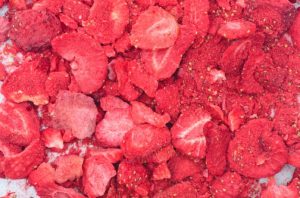An outbreak of hepatitis A in Australia linked to frozen berries from China has prompted memories of a huge 2013 hepatitis A outbreak linked to frozen berries in the U.S. At least five people in Australia are currently sick with the virus.
 In 2013, traceback investigation in the U.S. outbreak found that the virus was likely in frozen imported pomegranate seeds from Turkey that was used in Townsend Farms Organic Antioxidant Blend. One hundred sixty-five people were sickened; their illness onset dates ranged from 3/31/2013 – 8/12/2013. Forty-two percent of patients were hospitalized. All ill people who reported eating the recalled Townsend Farms product purchased it from Costco markets.
In 2013, traceback investigation in the U.S. outbreak found that the virus was likely in frozen imported pomegranate seeds from Turkey that was used in Townsend Farms Organic Antioxidant Blend. One hundred sixty-five people were sickened; their illness onset dates ranged from 3/31/2013 – 8/12/2013. Forty-two percent of patients were hospitalized. All ill people who reported eating the recalled Townsend Farms product purchased it from Costco markets.
Attorney Fred Pritzker, who represents clients in the U.S. outbreak, said, “people who bought this product did so because it was advertised as a healthy food. It’s unfortunate that it made so many people sick. The high hospitalization rate in this outbreak is indicative of the seriousness of the contamination.”
The genotype of hepatitis A in the 2013 U.S. outbreak was 1B, one that is rarely seen on the American content. It circulates in North Africa and the Middle East. As a result of this outbreak, the FDA detained all shipments of pomegranate seeds from Goknur, Turkey when presented for import.
The U.S. outbreak is now over, but it’s possible that people still have the contaminated product in their home freezers. There were three recalls of potentially contaminated products; the first on June 4, 2013 for Townsend Farms frozen berries; the second on June 26, 2013 for Woodstock Frozen Organic Pomegranate Kernels; and the third on June 28, 2013, for an expanded recall of the Townsend Farms berries.
Check your home freezers to see if you have any of the recalled product. If you do, throw it away in a sealed container so animals and other people can’t eat it. Wash your hands thoroughly and clean your freezer, since freezing doesn’t destroy the hepatitis A virus.
If you ate any of these berries and developed the symptoms of a hepatitis infection, which include clay colored stool, dark urine, jaundice (yellowing of the eyes and skin), fatigue, cramps, and loss of appetite, see your doctor. Most people recover without medical treatment, but some people, especially in this particular outbreak, can become seriously ill. People with liver disease can suffer serious complications from a hepatitis A infection.




